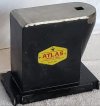- Joined
- Aug 11, 2016
- Messages
- 251
I crushed the grill on my old diesel garden tractor, and a new grill costs about $800, because the John Deere company has no soul. I am thinking of using this as an excuse to get an anvil. I can beat the old grill back into shape if I have something to beat it on.
I looked at a whole bunch of manufacturers, and it seemed like Kanca was the best bet for someone not willing to spend a mint. The Chinese anvils supposedly fall apart, and I read things about other anvils I didn't like too much.
Question: will a 77-pound anvil be sufficient for knifemaking and most general stuff a tinkerer fools with, or will I soon cry bitter tears because I didn't go for the 110-pound job?
I don't see myself doing really big work.
I have never actually forged a knife, but I feel that if I get an anvil for general purposes, I should get one that will also be well-suited to knifemaking.
I looked at a whole bunch of manufacturers, and it seemed like Kanca was the best bet for someone not willing to spend a mint. The Chinese anvils supposedly fall apart, and I read things about other anvils I didn't like too much.
Question: will a 77-pound anvil be sufficient for knifemaking and most general stuff a tinkerer fools with, or will I soon cry bitter tears because I didn't go for the 110-pound job?
I don't see myself doing really big work.
I have never actually forged a knife, but I feel that if I get an anvil for general purposes, I should get one that will also be well-suited to knifemaking.

